The Poetry Pilgrim Presses On
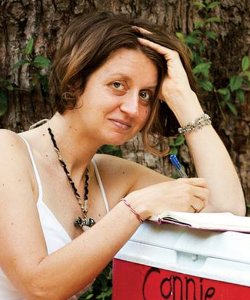
Poet Crystal Hoffman sets out on a pilgrimage across the country to write a collection of poetry and essays based on the narratives of people she meets along the way. And she’s doing it all on foot.
Jump to navigation Skip to content

Poet Crystal Hoffman sets out on a pilgrimage across the country to write a collection of poetry and essays based on the narratives of people she meets along the way. And she’s doing it all on foot.
Small Press Points highlights the innovation and can-do spirit of independent presses. This issue features Off the Grid Press, which publishes books exclusively by poets over the age of sixty.
P&W-supported poets Jon Sands, Adam Falkner, and Samantha Thornhill recently performed at North Country Community College in Saranac Lake, New York, as part of their "Poets in Unexpected Places" project. Sands, a poet, essayist, and author of The New Clean (Write Bloody Publishing, 2011), blogs about the experience. 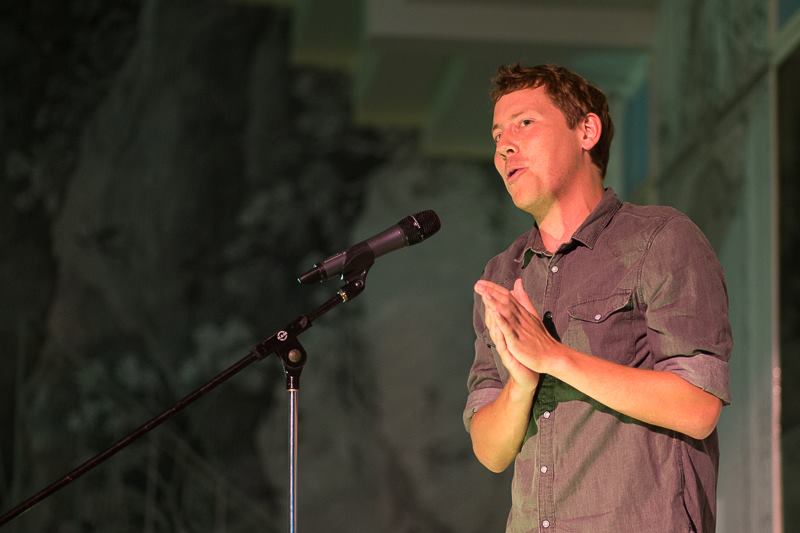 In 2010 Adam Falkner, Samantha Thornhill, and I cofounded “Poets in Unexpected Places” as a public art experiment. (We have since been joined, as curators, by Elana Bell and Syreeta McFadden.) And for one day in National Poetry Month, Adam, Samantha, and I had "free poetic reign" over the campus of North Country Community College (NCCC).
In 2010 Adam Falkner, Samantha Thornhill, and I cofounded “Poets in Unexpected Places” as a public art experiment. (We have since been joined, as curators, by Elana Bell and Syreeta McFadden.) And for one day in National Poetry Month, Adam, Samantha, and I had "free poetic reign" over the campus of North Country Community College (NCCC).
For over three years, we’ve staged seemingly impromptu poetry installations in public spaces throughout New York City, from the Q train to Times Square to Brooklyn Laundromats to Whole Foods—some sanctioned, some not. The goals are: 1) to blur the line between the artist and the audience 2) to bring poems back into a public sphere that provides the muse for so many of them 3) to challenge a creative public landscape largely curated by corporations, and 4) to acknowledge how many stories are inside every person you see, anywhere.
We have a fluid membership of writers who share their own work, or that of authors they love. You’re liable to hear Lucille Clifton, Audre Lorde, or Jack Gilbert reverberating off the subway walls.
Poets & Writers, the Adirondack Center for Writing, and NCCC brought us not just to English seminars on the NCCC campus, but to calculus classes, cafeterias, and chemistry labs (where Samantha performed her “Ode to an Apron” wearing an apron and safety goggles). I taught a midday writing workshop, and one student, Glen, a veteran and self-proclaimed “macho guy,” wrote a heartbreaking poem about one of his fellow soldiers, then joined us for the afternoon to read it aloud. 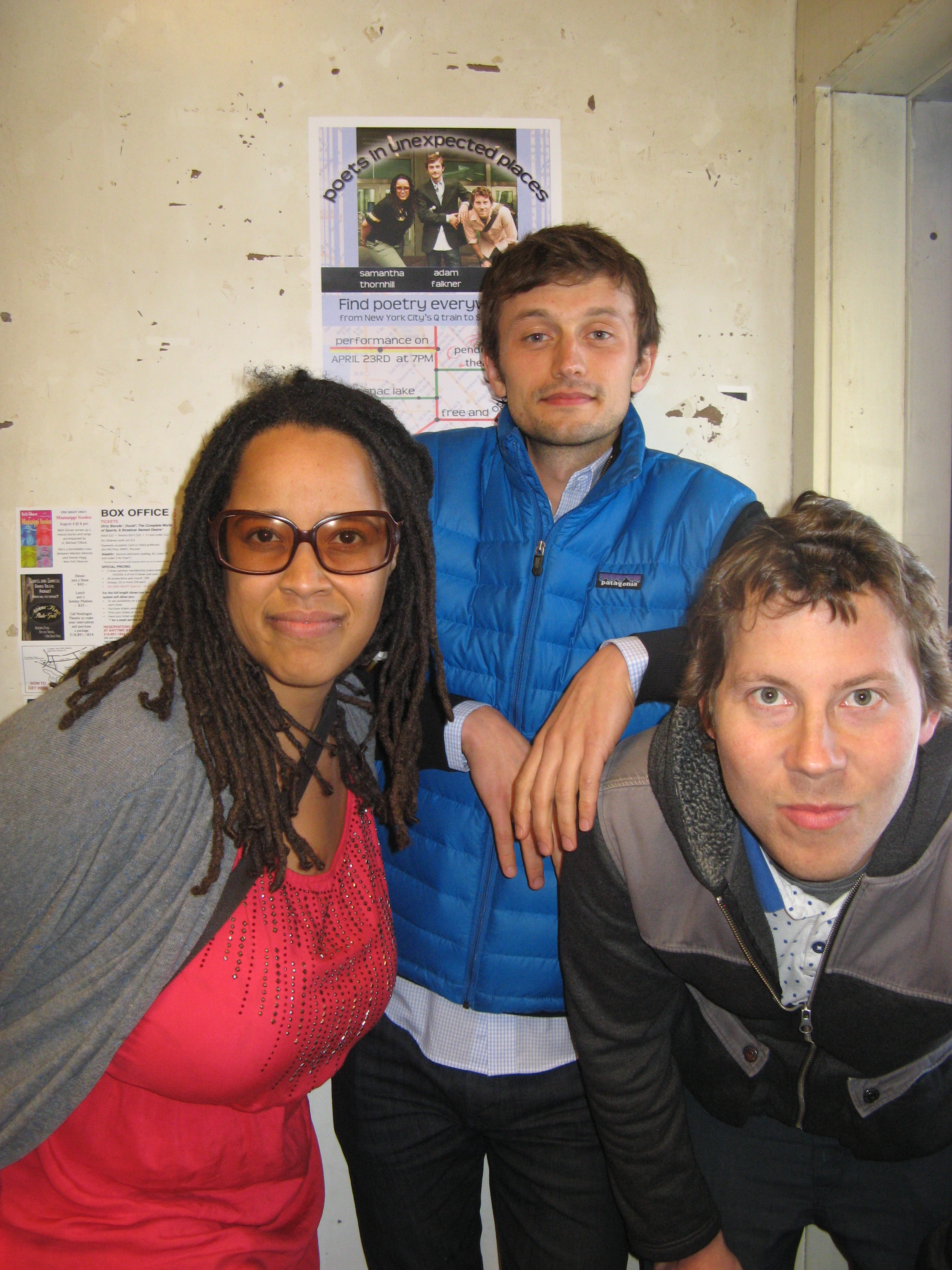 We stormed into something like forty classrooms that day with no introduction or apology. This gave the night’s culminating reading at the Pendragon Theater a Pied Piper-type feel. We had been gathering students, faculty, and staff throughout the day, from the math major to the cafeteria worker. After poetry showed up for them, they showed up for poetry. The workshop participants kicked off the night for an intergenerational audience of about seventy-five.
We stormed into something like forty classrooms that day with no introduction or apology. This gave the night’s culminating reading at the Pendragon Theater a Pied Piper-type feel. We had been gathering students, faculty, and staff throughout the day, from the math major to the cafeteria worker. After poetry showed up for them, they showed up for poetry. The workshop participants kicked off the night for an intergenerational audience of about seventy-five.
Then, with three chairs and a keyboard, we had a poetry show that could just as easily have taken place in Adam’s living room in Fort Greene, Brooklyn. We shared the stories that make us who we are, from my poems that celebrate and mourn my high school days to Adam’s poem “War in Baltimore,” a precise, hilarious, and sorrowed tale of teacher-student interaction. Samantha read her epic “Ode to Odetta” while Adam pulled bluesy notes out of the keyboard.
We stayed after for nearly an hour swapping stories with audience members. One young woman approached with tears in her eyes in response to Samantha’s elegy for a German Shepherd. She too was bitten by a dog who was subsequently euthanized. And this is the point: the hidden connections unlocked through poetry, regardless of whether it’s the Q train platform or a stage upstate. It’s the whisper in the parking lot, if only to yourself: "Damn. Me too. Now...."
Photos: Top: Jon Sands. Bottom, from left: Samantha Thornhill, Adam Falkner, Jon Sands. Credit: Nathalie Thille.
Support for Readings/Workshops in New York City is provided, in part, by public funds from the New York State Council on the Arts and the New York City Department of Cultural Affairs, with additional support from the Louis & Anne Abrons Foundation, the Axe-Houghton Foundation, The Cowles Charitable Trust, the Abbey K. Starr Charitable Trust, and the Friends of Poets & Writers.
Emerging poets got some good news yesterday: The Ruth Lilly Fellowships, given annually by the Poetry Foundation to five poets, ages thirty-one and younger, will nearly double in value next year thanks to a $1.2 million gift from the Dorothy Sargent Rosenberg Memorial Fund.
The new endowment, announced yesterday, will be put directly toward the fellowship prizes, which currently offer $15,000 to each recipient. The awards, the first round of which will be given next year, will also bear a new name: the Ruth Lilly and Dorothy Sargent Rosenberg Fellowships.
The Dorothy Sargent Rosenberg Memorial Fund, which gives a host of monetary awards to young poets each year—including the annual Dorothy Prizes, whose next deadline is October 5—is named in honor of poet Dorothy Sargent Fraser and her husband, Marvin Rosenberg, who met during the Depression while studying at the University of California in Berkeley. Fraser wrote and published poems under the name Dorothy Sargent; Rosenberg, a Shakespeare scholar, bequeathed his estate as a memorial to his late wife “as a means of giving a financial lift to deserving young poets.”
In Tuesday’s announcement, fund administrators Mary and Barr Rosenberg wrote on the Memorial Fund website that while they’ve been able to administer the prizes themselves the past nine years, “now it is time for the balance of Marvin’s bequest to be deployed in a long lasting way for the benefit of promising young poets….We are delighted to make this gift on Marvin’s behalf to the Poetry Foundation, so that the funds can continue to be entirely dedicated to the poets themselves. This is exactly what Marvin would have wished to bring about in Dorothy’s memory.”
The pair—Rosenberg’s son and second wife—is also hoping to find new administration for the Dorothy Prizes. Interested individuals and organizations are invited to contact Mary Rosenberg at marvinr@berkeley.edu.
For more information on the Ruth Lilly Fellowships, and to keep an eye out for submissions guidelines for the new prize, visit the Poetry Foundation website.
On June 25, 1857, French poet Charles Baudelaire published his book Les Fleurs du Mal (Flowers of Evil), which led to his conviction on charges of blasphemy and obscenity. Here's a sample: "Huddled, teeming, like gut-worms by the million, a clutch of Demons make whoopee in our brain and, when we breath, Death floods our lungs, an invisible torrent, muffled in groans." Get good and dark: Read a bit from Flowers of Evil then write a short poem. Unleash the gut-worms!
The Montreal–based Matrix Magazine and POP Montreal International Music Festival have teamed up to create the Lit Pop Awards—an annual literary competition for poets and fiction writers whose work “exemplifies a spirit of innovation and verve with rockstar attitude.”
Two winners will each receive a round-trip ticket and VIP pass to the POP Montreal Festival (September 25–29), accommodation at a bed and breakfast, fall publication in Matrix Magazine, a one-hundred-dollar honorarium, and a presentation at a Matrix Lit POP event during the festival. The deadline for entry is June 30.
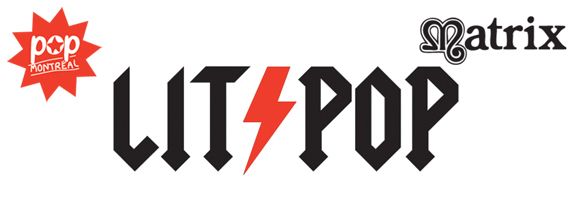
Eileen Myles, whose most recent collection is Snowflake/different streets (Wave Books, 2012), will judge in poetry; Sheila Heti, whose most recent novel is How Should a Person Be? (Holt, 2012), will judge in fiction.
The contest is open to residents of the United States and Canada. Poets may submit up to five poems and fiction writers may submit stories of up to 3,000 words with a $25 entry fee. Entries may submitted via Submittable, by e-mail at litpop2013@gmail.com, or by postal mail to Matrix Publications, 1400 de Maisonneuve Blvd W., LB 658, Montreal QC, H3G 1M8. Visit the website for complete submission guidelines and payment options.
Founded in Lennoxville, Ontario, in 1975, Matrix Magazine has been published as part of the creative writing program at Concordia University in Montreal since 1994. The POP Montreal Festival, held annually since 2002, is a festival of music, visual art, and literature that “champions independence in the arts by presenting emerging and celebrated artistic talents from around the world.”
"I know Midwesterners are accused of talking too much about the weather, but that criticism must surely come from people who don't have weather like ours," novelist David Rhodes once wrote to his editor at Milkweed Editions, Ben Barnhart. "These last few weeks have been filled with the bright, indolent humidity of summer, offset by sudden, tyrannical darkness and booming threats of supernatural violence. Not mentioning such revolutionary experiences would be inhuman." Go Midwestern and write a poem about today's weather. And if you're interested, read "After the Flood: A Profile of David Rhodes," from the September/October 2008 issue of Poets & Writers Magazine.
P&W–supported Larry Colker blogs about the triumphs and struggles of poetry workshops. He has cohosted the weekly Redondo Poets reading series for about fifteen years. In 2006 he won the California Writers Exchange Award, sponsored by Poets & Writers, Inc. His first book-length collection, Amnesia and Wings, was published by Tebot Bach in May 2013. By day Larry develops and delivers systems training for Kaiser Permanente. He lives in Burbank, California.
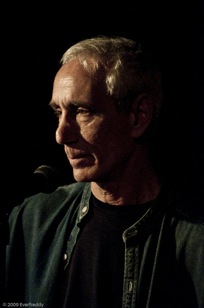 Billy Collins’s poem “Workshop” is a send-up of certain kinds of feedback and poems typically encountered in poetry workshops. As a veteran of dozens of workshops with many different leaders, and as the leader of a few, I both laugh at the parody and cringe for the targeted workshop attendees (myself among them). But I believe Collins is also implicitly implicating workshop leaders, who, after all, set the example.
Billy Collins’s poem “Workshop” is a send-up of certain kinds of feedback and poems typically encountered in poetry workshops. As a veteran of dozens of workshops with many different leaders, and as the leader of a few, I both laugh at the parody and cringe for the targeted workshop attendees (myself among them). But I believe Collins is also implicitly implicating workshop leaders, who, after all, set the example.
Why—and when—take a poem to a workshop? How to participate most effectively? How to lead a productive workshop? I have a few opinions to offer in this small space. Take them with as much salt as you wish.
Everyone assumes your poem is a draft. If you think a poem is finished and you just want acknowledgment of how good and finished it is and will be indignant at suggestions for changes (this is not unheard of), don't take it to a workshop. Likewise, don't bring it in if you honestly (secretly) think no else can appreciate your work! There's nothing wrong with having your own standards. But don't expect that others will relish being viewed as nincompoops.
The best participants (and leaders) ask themselves first: What can you tell about what the writer is trying to do from the piece itself? What strategies have been used and what choices have been made? Then: What is successful and what detracts? It is not unusual in regular workshops for poets to bring several reworkings of a poem back to the group. Familiarity with earlier versions is not necessarily useful. In the end the poem must work for readers who know nothing of its evolution. (However, those who have seen the difficult birth process of a marvelous poem do have a special kind of “midwife's” regard for the final product.)
Over time, one learns how to “do” a workshop as a participant. One picks up the etiquette. In most workshops that use the Iowa Writers' Workshop model, the author may not speak until discussion by the other participants and the leader is done—and the discussion is not directed toward the author. The author may ask questions after the discussion—about alternatives, for example—but explaining (defending) the poem is considered bad form. Take the feedback to your own counsel, where you can call certain comments misguided or idiotic, if you wish.
Leading a workshop is not a native skill either. And different experienced leaders settle on different approaches. But one of the most useful (and hard-earned) skills is referring to (or reading, or quoting) other poems that either illustrate a point of craft, or provide an example of a particular “maneuver,” or expand the writer's view of how a subject could be treated. I think that this both strengthens one's consciousness of belonging to a truly remarkable community and, frankly, raises humble awareness that one is not uniquely endowed in solving artistic problems in writing. But the satisfaction of solving those problems on my own terms—as the song says, “they can't take that away from me.”
Photo: Larry Colker. Credit: Fred Turko.
Major support for Readings/Workshops in California is provided by The James Irvine Foundation. Additional support comes from the Friends of Poets & Writers.
Last night in Toronto, the 2013 Griffin Poetry Prizes were given for the collections Like a Straw Bird It Follows Me (Yale University Press), written by Palestinian poet Ghassan Zaqtan and translated from the Arabic by Fady Joudah, and What's the Score (Mansfield Press) by Canadian poet David W. McFadden. Each winner received $65,000
The finalists, who each gave a reading along with the winners, were Jennifer Maiden for Liquid Nitrogen (Giramondo Publishing), James Pollock for Sailing to Babylon (Able Muse Press) Alan Shapiro for Night of the Republic (Houghton Mifflin Harcourt), Brenda Shaughnessy forOur Andromeda (Copper Canyon Press), and Ian Williams for Personals (Freehand Books).
Founded in 2000, the Griffin Poetry Prize is given annually for books of poetry written in or translated into English and published anywhere in the world. One prize is given to a living Canadian poet or translator; a second is given to a living poet or translator from any country.
This year’s judges were Suzanne Buffam of Canada, Mark Doty of the United States, and Wang Ping of China. Each read 509 books of poetry, which were submitted from forty countries, and included fifteen translations. The trustees of the Toronto–based Griffin Trust For Excellence In Poetry, which administers the prize select the judges annually.
Scott Griffin and trustees Margaret Atwood, Robert Hass, Michael Ondaatje, and David Young hosted the event. Trustee Carolyn Forché presented each shortlisted poet with a leather-bound edition of their book and a $10,000 honorarium.
For the 2014 prizes, publishers may submit books published between January 1 and December 31, 2013. Only publishers can submit books for consideration; self-published titles are not eligible. The deadline for submissions is December 31. Visit the website for complete submission guidelines.
New York City-based independent publisher New Directions recently relaunched its Poetry Pamphlets, a series originally published by founder James Laughlin in the 1940s.